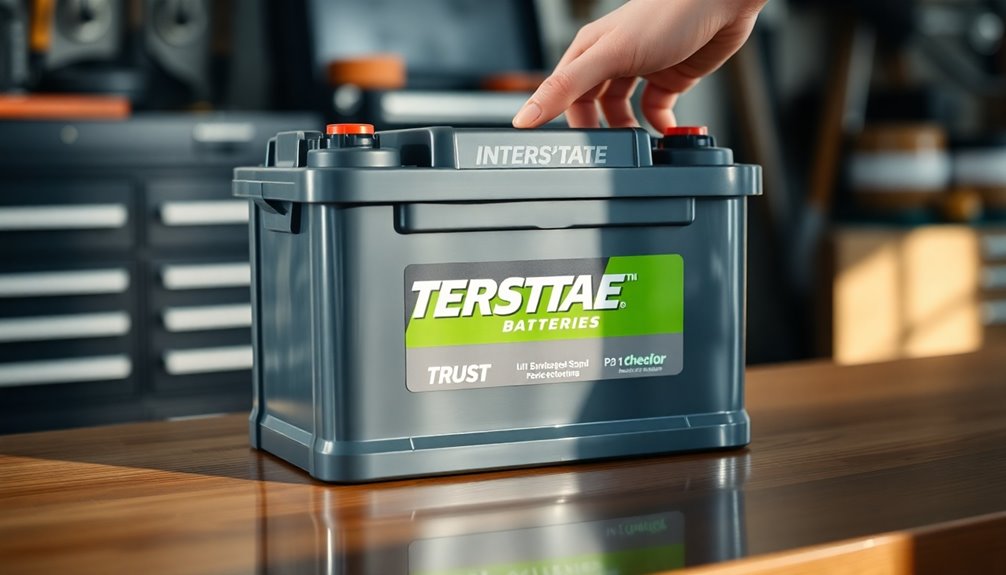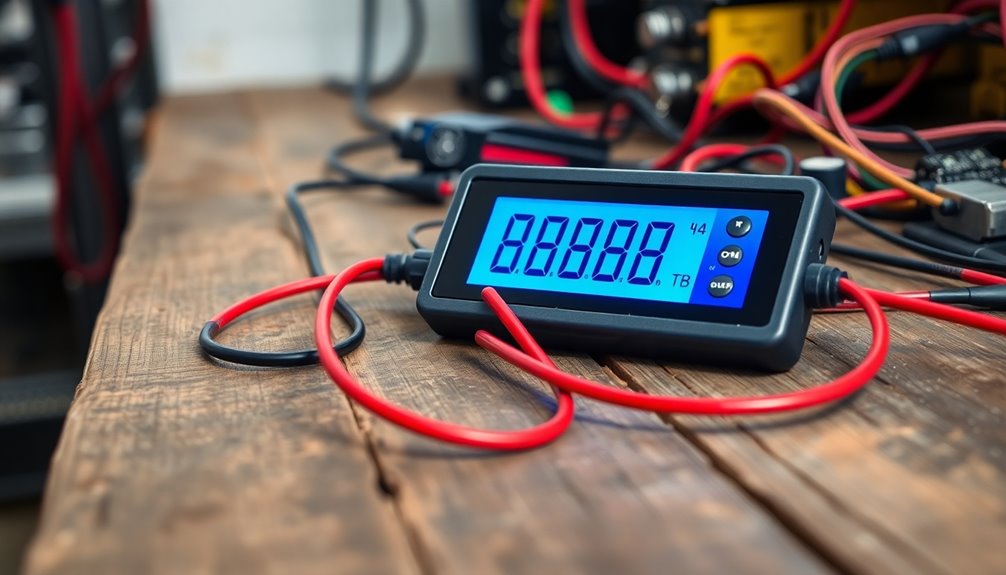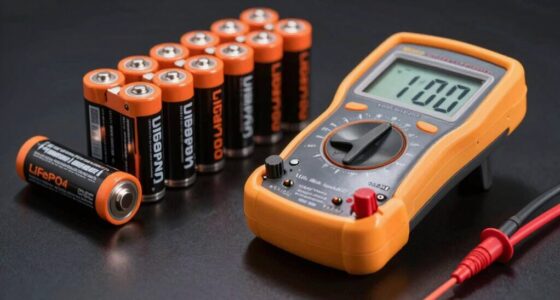Yes, batteries do expire, usually within 2 to 10 years based on their type. To check their lifespan, look for signs like reduced performance, swelling, or leakage. A multimeter can help measure voltage output, and be sure to inspect for any physical damage. To extend their life, store batteries in a cool, dry place and charge them appropriately—keeping lithium-ion models at 40-60% helps. Regular usage and recharging can also boost performance. By staying vigilant about battery care, you can maximize their longevity and effectiveness, and there's more to explore on this topic.
Key Takeaways
- Yes, batteries do expire, with typical lifespans ranging from 2 to 15 years depending on type and storage conditions.
- Signs of battery expiration include reduced performance, swelling, leakage, or an inability to hold a charge.
- Regularly inspect batteries for corrosion and use a multimeter to check voltage output for health assessment.
- Store batteries in a cool, dry place and maintain lithium-ion batteries at 40-60% charge for long-term storage.
- Recycle expired batteries responsibly to protect the environment and recover valuable materials; avoid regular trash disposal.
Understanding Battery Expiration
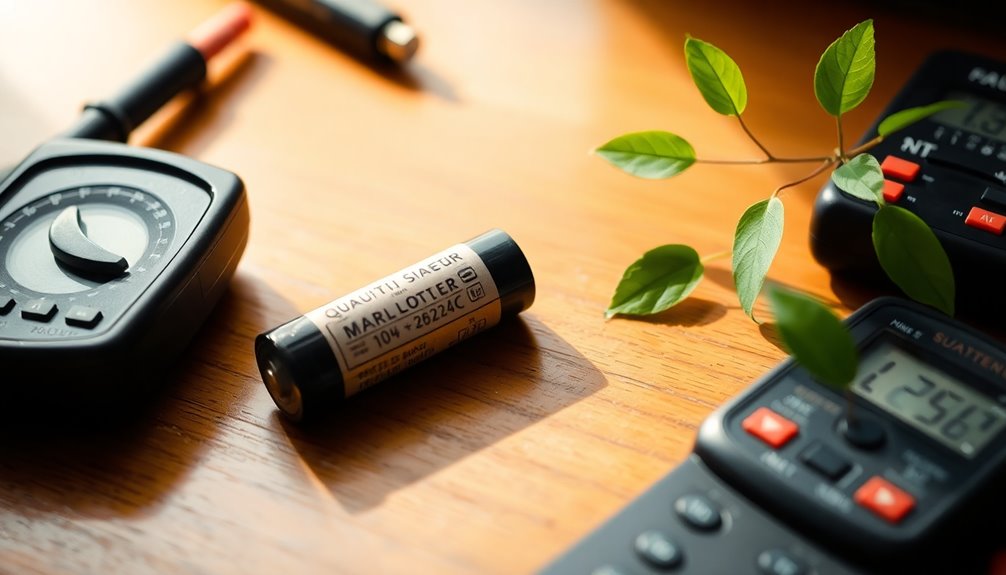
Understanding battery expiration is vital for anyone who relies on these power sources for their devices. Batteries, whether alkaline or rechargeable, have expiration dates that indicate their functional lifespan, typically ranging from 2 to 10 years.
Alkaline batteries can perform effectively for up to 10 years under ideal storage conditions. In contrast, rechargeable batteries like lithium-ion usually last 2-3 years, regardless of use.
It's important to monitor performance, as expiration doesn't mean instant failure; instead, it signals a gradual decline. Factors like temperature and humidity greatly influence shelf life, with extreme conditions increasing self-discharge rates.
Shelf Life of Different Batteries
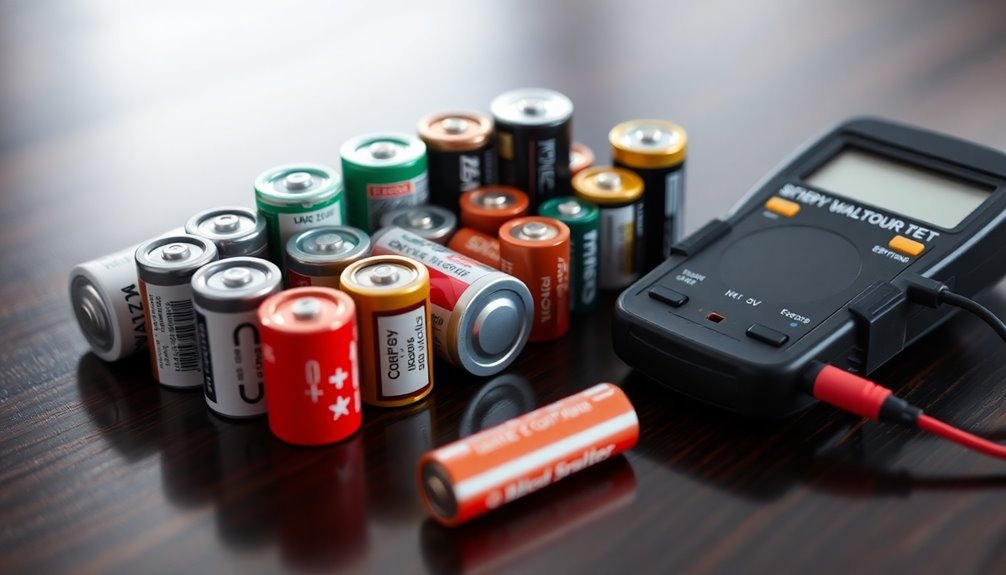
When you're selecting batteries, it's crucial to know their shelf life and how it varies by type.
Different batteries, like alkaline or lithium, can last anywhere from a few years to over a decade, depending on storage conditions.
Understanding these factors can help you make informed choices and extend the life of your batteries.
Shelf Life Overview
Different types of batteries have varying shelf lives, which can greatly impact your usage and storage choices. Here's a quick overview of the shelf life of common battery types:
| Battery Type | Shelf Life (Years) | Storage Environment |
|---|---|---|
| Alkaline Batteries | 5 to 10 | Cool, dry, avoid mixing |
| Lithium Batteries | 10 to 15 | Proper storage conditions |
| Lithium-Ion | 2 to 3 | Avoid extreme temperatures |
| Nickel-based (Ni-MH) | 3 to 5 | Maintain 40% charge |
To maximize shelf life, guarantee you store batteries in proper conditions, away from extreme temperatures, and monitor their state to avoid mixing different types.
Factors Affecting Longevity
Although various factors influence battery longevity, proper storage conditions play an essential role in maximizing their shelf life.
Alkaline batteries can last 5-10 years, while non-rechargeable lithium batteries may last 10-15 years when stored correctly. To guarantee ideal conditions, keep batteries at a temperature between 68-77°F and avoid high humidity. This is important since excessive heat can accelerate self-discharge rates, leading to premature failure.
Additionally, lithium-ion batteries typically have a shorter shelf life of just 2-3 years due to their battery chemistry, regardless of usage. For nickel-based batteries, aim for a storage charge of about 40% to minimize capacity loss.
Battery Type Comparisons
Understanding the shelf life of various battery types can help you make informed choices about which batteries to use for your devices.
Here's a quick comparison:
- Alkaline Batteries: Typically last 5-10 years, with some brands like Rayovac Fusion exceeding 10 years under ideal battery storage conditions.
- Lithium Batteries: Non-rechargeable varieties can last 10-15 years due to low self-discharge rates.
- Rechargeable Batteries: Lithium-ion batteries generally have a shelf life of 2-3 years and require regular monitoring.
- Lead-Acid Batteries: Can be stored for up to 2 years but need periodic recharging to prevent sulfation.
Additionally, nickel-based batteries like NiMH should maintain a 40% charge to minimize capacity loss during storage.
Understanding the importance of self-love can also help you make choices that extend not just battery life, but the longevity of your devices as well.
Choose wisely to optimize battery life!
Factors Impacting Battery Longevity
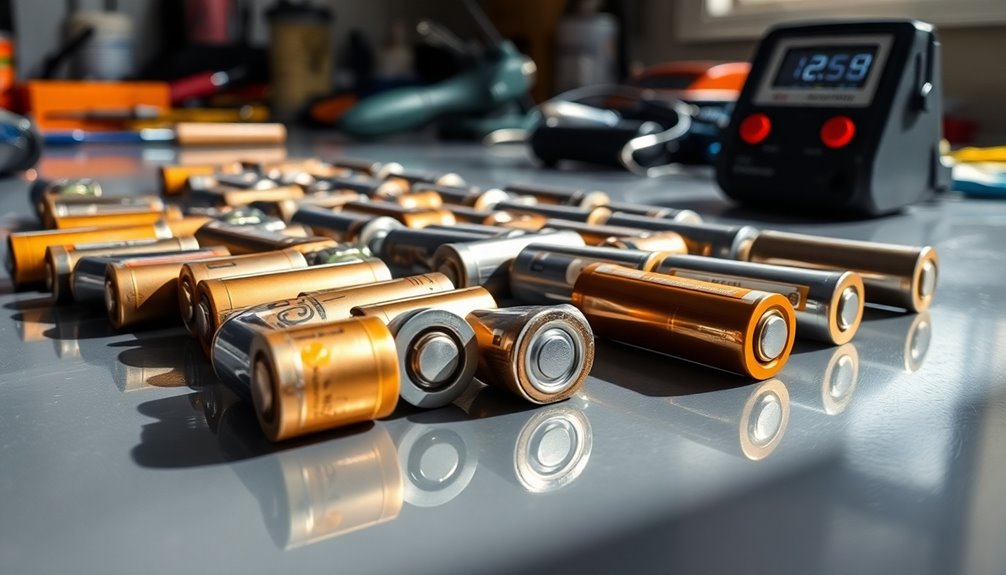
When it comes to battery longevity, temperature and humidity play a huge role.
Storing your batteries in ideal conditions can prevent premature capacity loss and guarantee they perform well over time.
Plus, the quality and type of battery you choose can make a significant difference in how long they last.
Temperature and Humidity Effects
Temperature and humidity play essential roles in determining your batteries' lifespan and performance.
To guarantee your alkaline batteries last longer, consider these tips:
- Store batteries in a temperature range of 30 to 70°F to optimize longevity.
- Avoid high temperatures above 85°F, which can increase self-discharge rates and hasten expiring.
- Keep batteries in a dry environment with around 50% relative humidity to prevent moisture-related leakage and corrosion.
- Extreme cold can harm their chemical composition, reducing power output when you need it.
Quality and Type Matters
The quality and type of battery you choose can greatly impact its longevity and performance. High-quality batteries typically have lower self-discharge rates, ensuring they last longer than cheaper options.
| Battery Type | Shelf Life |
|---|---|
| Alkaline Batteries | 5-10 years |
| Lithium Batteries | 10-15 years |
| Rechargeable Batteries | 2-3 years |
When storing batteries, keep them in cool, dry places. High temperatures can accelerate self-discharge, reducing battery life. Regularly inspect your batteries, as capacity fades over time. For rechargeable batteries, maintain an ideal state of charge and avoid letting them fully deplete. Choosing the right quality and type can make all the difference in extending battery life.
Proper Storage Techniques

Properly storing your batteries can greatly extend their lifespan. To guarantee they stay in top condition, follow these tips:
- Store in a cool, dry place: Aim for temperatures between 59°F (15°C) and 77°F (25°C) to avoid power loss and prevent leakage.
- Use original packaging: Keeping batteries in their original packaging minimizes contact with metal objects, reducing the risk of short-circuiting.
- Avoid extreme temperatures: High heat or freezing conditions can harm your batteries' chemical composition and overall lifespan.
- Regularly inspect: Check stored batteries for signs of leakage or corrosion and remove any damaged units immediately.
Monitoring Battery Performance

After confirming your batteries are stored correctly, it's important to keep an eye on their performance. Regular monitoring helps you identify drops in capacity, especially with rechargeable batteries like lithium-ion and NiMH, which can suffer from self-discharge over time.
Use battery testers from retailers like Batteries Plus to measure voltage and check if a battery is still viable. Tracking expiration dates and manufacturing dates is essential since alkaline batteries last about 5 to 10 years, while rechargeable ones typically last around 5 years.
Implementing a First-In, First-Out system guarantees older batteries are used first, minimizing expired ones. Regularly charging and discharging your rechargeable batteries also helps maintain their capacity and overall performance.
Recycling Expired Batteries

Recycling expired batteries is essential for protecting the environment and recovering valuable materials.
These batteries contain hazardous chemicals that can harm our planet if not disposed of properly.
Here's how you can recycle responsibly:
- Check Local Recycling Programs: Look for designated recycling centers in your area that accept expired batteries.
- Follow Disposal Methods: Familiarize yourself with local guidelines, as disposal methods can vary by region and battery type.
- Utilize Take-Back Programs: Many retailers and battery manufacturers offer convenient take-back options for expired batteries.
- Educate Others: Share information about responsible recycling practices to encourage others to participate.
Frequently Asked Questions
How Can I Extend the Lifespan of My Battery?
To extend your battery's lifespan, store it in a cool, dry place at around 59°F (15°C).
If you're using rechargeable batteries, keep them at about 40% charge when not in use.
Regularly check their performance; replace them when you notice a significant drop in capacity.
Use original packaging or non-conductive materials to avoid short-circuiting, and practice FIFO by using older batteries first to maintain peak performance.
Are Batteries Still Good After the Expiration Date?
Imagine your batteries as aging warriors, still holding their ground even after their designated time. Yes, they can still be good after the expiration date.
Many can retain a significant charge for years if stored right. While performance might wane, especially with rechargeable types, they often still serve their purpose.
Check them regularly, keep 'em cool and dry, and you'll find that some expired batteries can still be valiant allies in your devices.
Can You Use 10 Year Old Batteries?
You can use 10-year-old batteries, but their effectiveness depends on the type and storage conditions.
Alkaline batteries might still work, while non-rechargeable lithium ones often last longer.
However, rechargeable batteries may show significant capacity loss after that time.
Always check for leakage or corrosion before use, and consider testing them with a voltage tester to verify they still hold a charge.
It's better to be cautious and avoid device malfunctions.
Is There a Way to Check Battery Life?
You can check battery life using simple methods.
First, grab a battery tester to measure voltage, which indicates its strength.
For rechargeable batteries, monitor their capacity and charging cycles to spot performance drops.
Regularly inspect batteries for any signs of damage, corrosion, or leakage.
If you're storing lithium-ion batteries, make certain they're not fully charged to avoid capacity loss.
Conclusion
To sum up, keeping your batteries in good shape can really pay off. Did you know that proper storage can extend a battery's life by up to 50%? By understanding their expiration, employing the right storage techniques, and monitoring performance, you can maximize their usage. Plus, always remember to recycle expired batteries responsibly to protect the environment. So, take a few moments to care for your batteries, and you'll enjoy their benefits for much longer!


